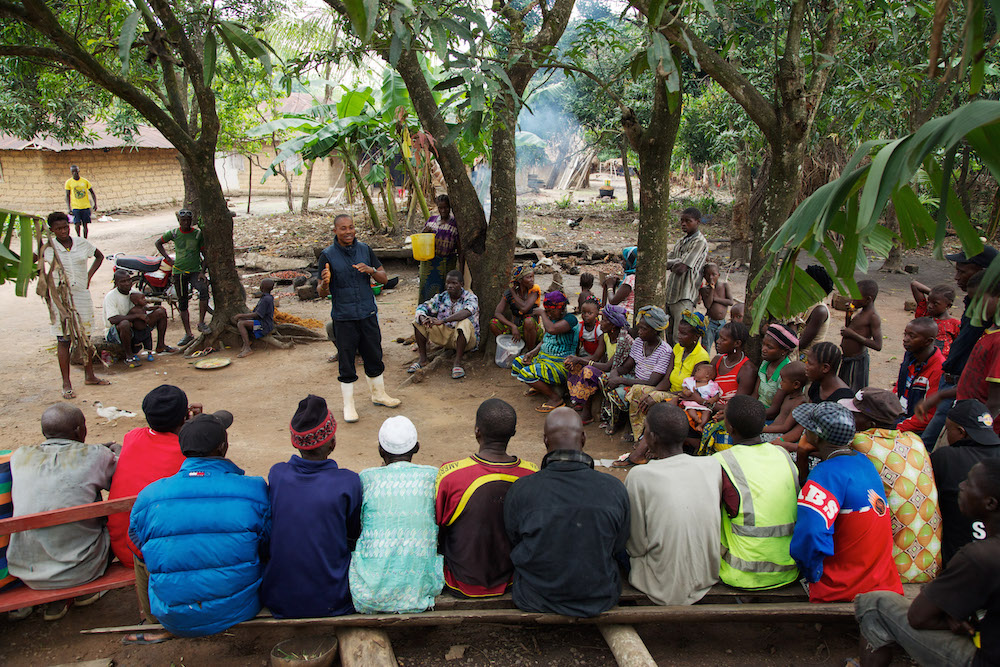
Achmed Sesay, a Namati community paralegal, addresses a gathering of villagers in Masethele village, Sierra Leone. Photo reproduced with permission by Namati. (All rights reserved)
In 2010, Sierra Leone Agriculture (SLA) Ltd., a British-owned company, signed a lease with Bureh, Kasseh and Maconteh (BKM) Chiefdom in the Port Loko District of Sierra Leone for 41,582 hectares of land—including the rivers, houses, and roads that it encompassed. Among other promises, the company agreed to create 8,000 jobs, build schools, roads and health centers, and provide skills training for the over 40 communities in the chiefdom. Then, in 2011, SIVA Group, an Indian-owned and Singapore-based company, bought the SLA concession for USD $5 million to establish an oil palm plantation.
As is the all too common story, the company failed to pay rent and refused to make good on the other promises, impacting the lives and livelihoods of over 3,000 landowners and land users. But, this time there was a different ending. Those affected partnered with community paralegals, working with Namati, who supported them to understand the law and claim their rights. As a result the communities won back their land and damages totaling nearly USD $250,000.
The issue began when the Paramount Chief, the local Member of Parliament, and the Deputy Speaker of the House of Parliament—who held shares in the company—directly negotiated the terms of the lease with company officials. No landowners read or were made aware of the terms of the lease agreement.
What happened next was not what the communities envisioned.
Namati's paralegals do not provide a legal service. Rather, they aim to empower those affected to tackle such problems on their own.
When SIVA Group took over the concession, they cleared 7,114 hectares, an area roughly equivalent to 17,000 football fields, to make way for their operations. In the process, they destroyed the communities’ valuable wild palm, cashew trees and other economic crops—and provided no compensation. They made no effort to implement the promised development projects and fell behind on their rent payments. The communities attempted to resolve the situation amicably numerous times, but the company refused to meet with them. They then reported their concerns to their Paramount Chief, Member of Parliament, and the district council, but no action was taken.
The legal empowerment approach used by Namati deploys community paralegals who are trained in basic law and in skills like mediation, organizing, and advocacy, but they do not provide a legal service. Rather, they aim through partnerships with the local communities, to empower those affected with the legal knowledge and skills they need to tackle such problems on their own.
In the present case, the paralegals and community representatives did the required research to pinpoint which laws, policies, and terms the company had violated. The communities put together a list of demands and, with the support of the paralegals, drafted a letter to the company requesting a meeting to discuss the violations and the renegotiation of the lease.
Instead of negotiating, the company, with the help of political elites, pressured the landowners to accept their draft of a new lease. With greater knowledge of their rights, the landowners rejected the unjust lease. The company did pay the backlog of rent for 2016 but went no further and ignored all attempts by the communities and paralegals to communicate. Although at Namati we see court as a last resort, it became clear that litigation was necessary. We filed a case in June 2018.
The communities got their land back, but they’ve never seen the money they were awarded.
The court ruled in favor of the communities, ordering the company to return the land and pay the communities the equivalent of nearly USD $250,000. Unfortunately, by the time the verdict was read, the company had folded and the staff had left the country. The communities got their land back, but they’ve never seen the money they were awarded.
By most measures, the case was a success. Community representatives have been equipped to understand and use the law, the communities have their land back and are better positioned to deal with investors in the future, and the court ruling sent a strong message to companies to comply with the laws of the country and the agreements they negotiate. But the process was not without its challenges. The most problematic being the unequal power dynamics between political elites and communities.
In a society like Sierra Leone’s, where politics penetrate every facet of life, the people rely on politicians to fix broken systems. Some Members of Parliament promised to help the communities but there was no follow through. However, through the process, paralegals learned that the landowners themselves wield considerable decision-making power. When equipped with the information and tools to act, they proved to be dependable and effective allies.
The success of the case relied on the affected landowners and communities taking collective action. Power dynamics also threatened this unity. Political elites with vested interest in the continued operations of the company persistently intimidated the landowners into signing an unfair lease. Creating trust and solidarity among the community representatives, the other affected individuals, and the paralegals was vital.
As this case illustrates, legal empowerment approaches are not without challenges, but they are crucial to equipping communities with the knowledge and tools needed to fight back against exploitive land investors.
